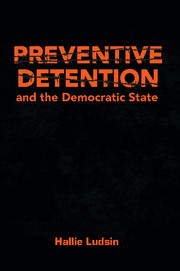Book contents
- Frontmatter
- Contents
- Acknowledgements
- List of Acronyms and Abbreviations
- Introduction
- 1 The Theoretical Framework
- 2 The Policy Debates
- 3 Preventive Detention under International Law
- 4 The History of Preventive Detention in India
- 5 India's Current Preventive Detention Legislation
- 6 India: Preventive Detention and Due Process
- 7 India: The Risk Society and the Slippery Slope
- 8 Preventive Detention in England
- 9 England: Preventive Detention and Due Process
- 10 Preventive Detention in the United States
- 11 The United States: Preventive Detention and Procedural Due Process
- 12 Preventive Detention's Slippery Slope
- 13 Preventive Detention and Liberal Democracy
- Index
9 - England: Preventive Detention and Due Process
Published online by Cambridge University Press: 05 March 2016
- Frontmatter
- Contents
- Acknowledgements
- List of Acronyms and Abbreviations
- Introduction
- 1 The Theoretical Framework
- 2 The Policy Debates
- 3 Preventive Detention under International Law
- 4 The History of Preventive Detention in India
- 5 India's Current Preventive Detention Legislation
- 6 India: Preventive Detention and Due Process
- 7 India: The Risk Society and the Slippery Slope
- 8 Preventive Detention in England
- 9 England: Preventive Detention and Due Process
- 10 Preventive Detention in the United States
- 11 The United States: Preventive Detention and Procedural Due Process
- 12 Preventive Detention's Slippery Slope
- 13 Preventive Detention and Liberal Democracy
- Index
Summary
Having identified the “deviant others” targeted for preventive detention and other liberty restrictions in the previous chapter, this chapter establishes that England has carved out an inferior legal system that grants diminished rights to suspected terrorists and persons suffering from antisocial personality disorder. The chapter begins by responding to the jurisdictional issues raised in the policy discussions in Chapter 2 before turning to the due process rights that accrue to detainees. It then assesses whether anyone can be held in indefinite detention. This chapter finishes with a big-picture account of preventive detention in England, noting England's fall down preventive detention's slippery slope and the extent of detainees’ diminished rights. It also highlights the gross discrimination between security detainees and mental health detainees – a discrimination endorsed by the Convention.
England is not currently facing an emergency, which means it does not have the power to detain suspected terrorists for more than approximately 14 hours a day. The Terrorism Prevention and Investigation Measures (TPIM) notices fall just short of full preventive detention under English and Convention law, although this book continues to treat overnight residency restrictions as a form of preventive detention. Pre-charge detention normally would not be considered preventive detention because it is intended to buy the police time to investigate terrorism crimes. In practice, however, the government uses it to circumvent the criminal justice system and hold detainees in preventive detention. For these reasons, TPIM notices that order detention and pre-charge detention contribute to England's transformation of preventive detention from an extraordinary emergency measure to an ordinary law enforcement measure that establishes an inferior legal system for its targets.
Detention jurisdiction
Following the outline described in Chapter 2, this section examines the issues of how England chooses whom to detain, who is responsible for that choice and what type of law is applied to that decision. As a reminder, the first issue highlights the assumptions the law makes about who is dangerous. The latter two determine the extent of due process rights England owes detainees.
Who may be detained
The Convention offers little guidance on how states should choose which dangerous persons to detain.
- Type
- Chapter
- Information
- Preventive Detention and the Democratic State , pp. 261 - 298Publisher: Cambridge University PressPrint publication year: 2016



